The highly-anticipated A24 film First Cow from director Kelly Reichardt, co-written by Jon Raymond and based on his novel ‘The Half-Life‘, tells the story of Cookie (John Magaro) and King-Lu (Orion Lee), two travellers who come to collaborate on a very lucrative business – one which also relies on the secrete use of an influential landowner’s prized dairy cow.
Ahead of First Cow’s release in the UK, Outtake spoke with stars Magaro (Carol, The Big Short) and Lee (Star Wars Episode VIII: The Last Jedi) about settling into Frontier-era patterns of life, cooking like Lewis and Clarke, and the power of just listening.
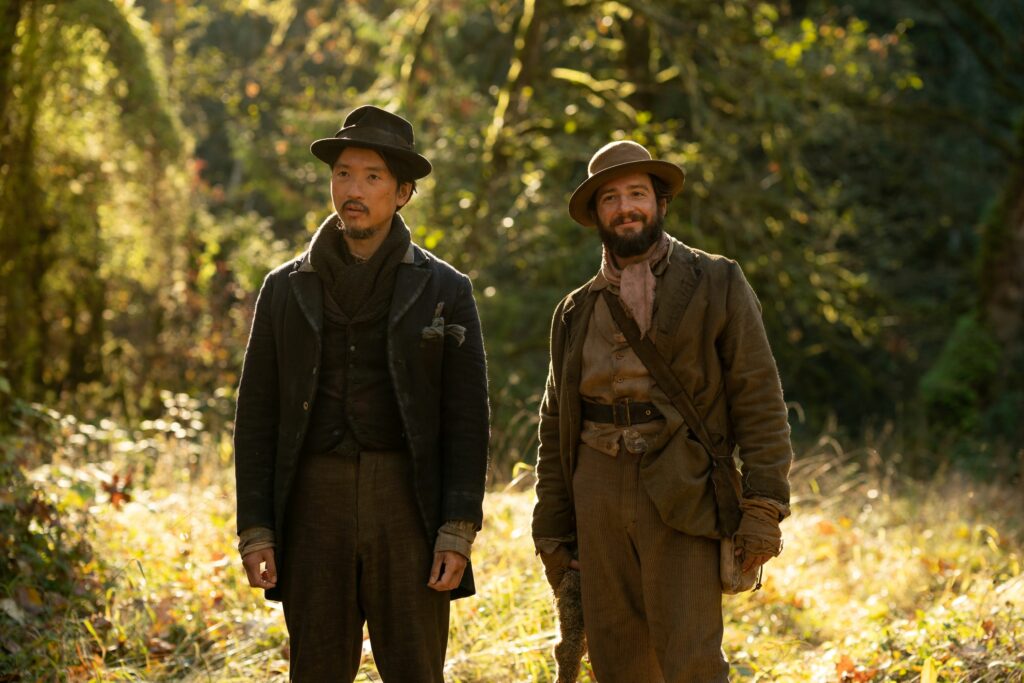
It’s been a long road for First Cow to finally land in cinemas!
John Magaro: This has been a long journey, yeah. This thing came out in 2019 when we were at Telluride, and now it’s finally coming out in the rest of the world. It’s nice that we get to share it.
Orion Lee: I was living in London before all of this, and I would have loved to have seen the independent cinemas welcoming the film onto the screen. But it’s a different world now. I’ve since gone back to Australia to have an arranged marriage [laughs]. No, to get introduced to the daughter of one of my dad’s friends. We’re now married with a newborn, so that’s all been great.
You’ve been busy! It’s interesting though thinking about how differently First Cow might have been received pre-pandemic, given how much the world has slowed down to a pace that’s closer to those early Frontier days. Have you watched it since its premiere, and did you view of it change?
John Magaro: I haven’t seen it again since the pandemic. I’m not a big fan of watching myself. I tend to watch something when it’s first shown, and maybe I’ll revisit it again in a few years just to see if I can learn anything from it.
Orion Lee: I rarely watch things twice, and that includes things I’m in. But you know, I think the topic of genuine friendship comes up too little in film. We’re mainly telling stories about great loves and passions. I like to think that whatever the season, that much will resonate.
And when you first read the script, did anything in particular strike you about this story?
John Magaro: Not often do you get a script that’s so clear, where the vision is so clear on the page, where it’s just so heartfelt and genuine. And in fact, not a lot changed in the actual shooting of the movie. Kelly [Reichardt] and Jon [Raymond] painted a very clear picture that stuck throughout. That struck me; it just makes you feel like you’re going to be in the hands of a very capable, thoughtful, and confident director. It also had such a beautiful, beautiful ending – the journey was so clear and wonderful that I think both Orion and I walked away with tears in our eyes, after the first read.
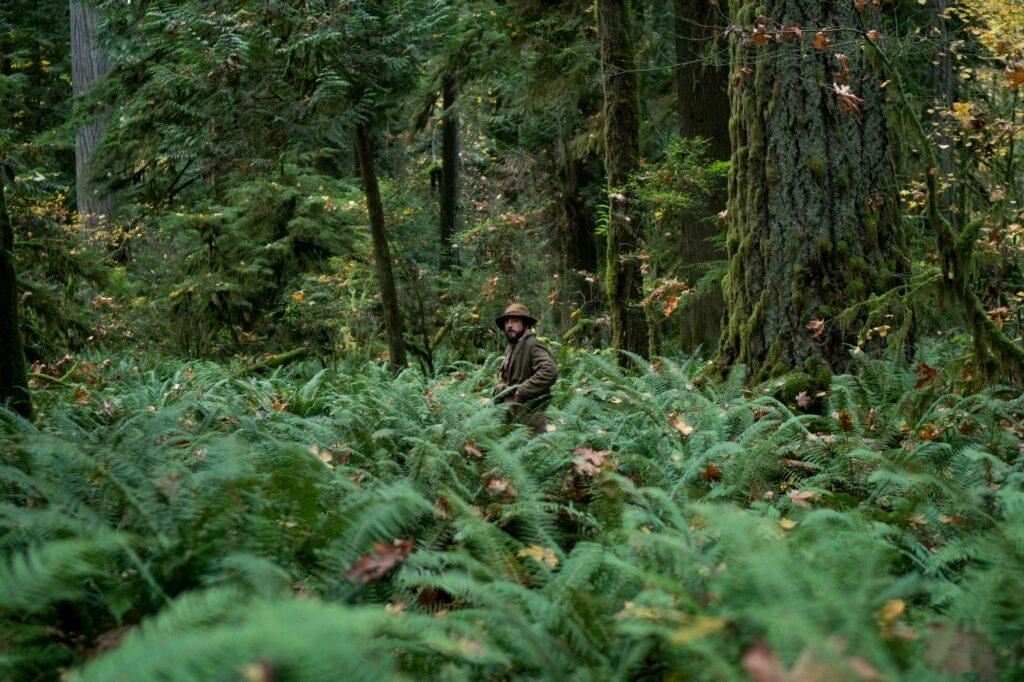
Orion Lee: Yes, with regards to the ending, but I think I must have read the script differently to John in other aspects. First of all though, there was always this huge respect for Kelly Reichardt because I’d seen her work and thought it was fantastic. But I can never quite picture a script – and I got to the end and there’s that last line, and I reading it and thought, “What? Why? I don’t get it! What happened?”. But it was always touching; just that to me, it’s a little bit of a mystery why it’s so touching.
John Magaro: I think it’s probably just the root of what we were talking about before, it’s the friendship that’s so pure. You really feel that journey, that building a friendship and need for each other, and it creeps up on you, just like the development of a friendship often does.
Orion Lee: Yeah, and I think upon reflection, people often ask me how we work out such amazing chemistry. There are a few things. Firstly, with friendships, it’s not like you fall in love with them and there’s fireworks. It’s very gradual, and the film takes you on this slow journey such that, as time passes, you might not even realise it’s happening. And one of the wonderful things about friendship is that it’s very non-demanding. And then the other thing I tell people is that John and I really respect each other’s craft, and we never worked out anything before shooting. That meant we were always just listening to each other in the scene, and I think that quality really comes across.
John Magaro: I’d add that the story of First Cow was two people developing a friendship and getting to know each other. And that’s exactly what happened with us over the process of making this film. We didn’t know each other beforehand, and we were getting to know each other better over that time, so you’re seeing something very genuine happening. It paralleled the story we were telling.
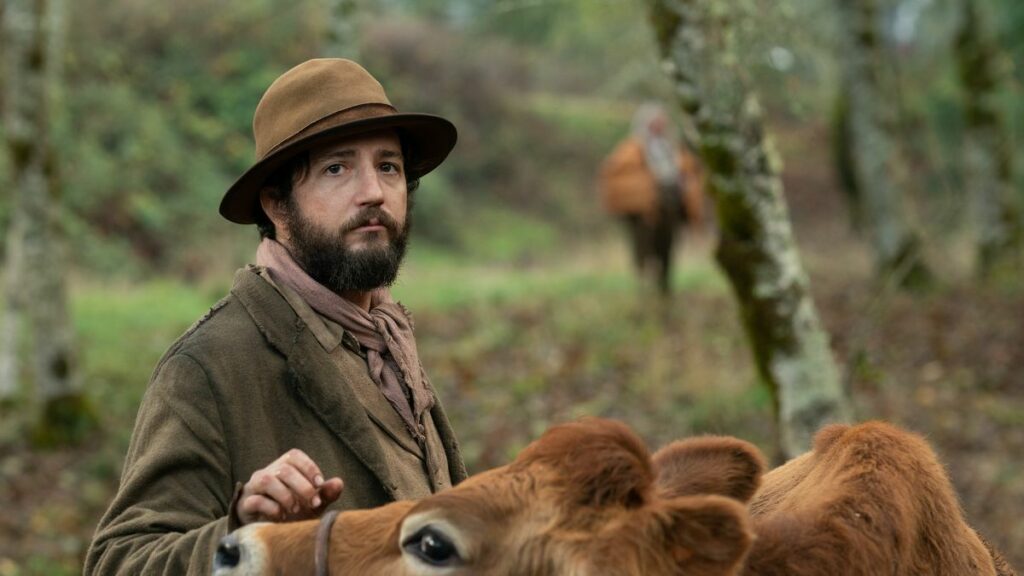
What do you think is at the core of your characters’ friendship? Because from the very beginning there’s this instant trust and vulnerability between them, which is rarely seen.
John Magaro: I think the basis is necessity. That’s the core. King-Lu needs someone to help because he’s on the run, and Cookie just happened to be kind enough to help him. And then when they see each other in town, Cookie needs a place to crash, and King-Lu has a place. Now obviously, a lot more develops out of that, but the basic kernel is necessity.
Orion Lee: I like to think it’s a combination of what John just said, but I’m a bit more romantic… One of the things I had to reconcile was that, when I first read the script, my image of Cookie and King-Lu was that they were very similar. I thought they had a similar outlook or philosophy of life: they don’t carry guns around, they’re non-violent, trying to make it in this new world. But Kelly wanted something where the two people appeared very different on screen. And she said, “No, King-Lu is nothing like Cookie. He’s very brash and charming, like a con man. He’s got ideas and he’s always chatting.” And the way I reconciled that was by realising that when I was a child, I was very shy and wouldn’t look people in the eye, let alone talk to people. Then it changed, and that was a gradual process. I think King-Lu as a child was very quiet and reserved. And because I like to mix my history with my characters’ history and find which bits match, I felt like when Cookie and King-Lu – and maybe I am too romantic – I think their souls recognised each other.
John Magaro: They’re also both outsiders, and I think they recognise that in each other. Not fitting into this world is what connects them and helps them forge their relationship.
Orion Lee: They’re both very lonely. They may not think about it so much because they’re too busy surviving, but I think that actually they’re very lonely.
John Magaro: And craving relationships. At the beginning of the story, you can just feel that loneliness they share.
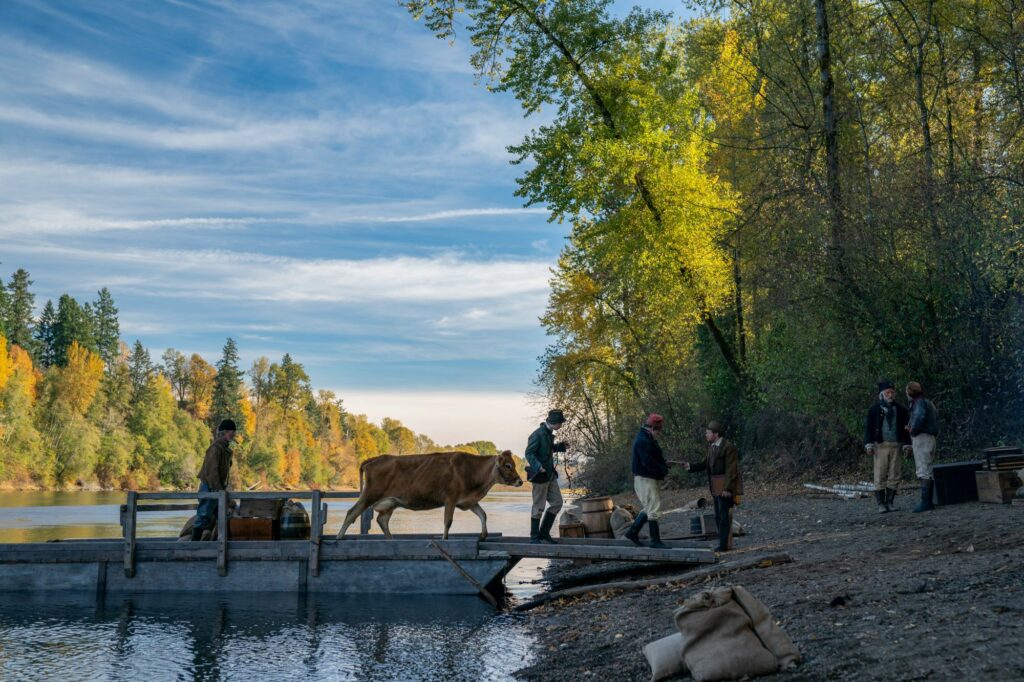
What’s interesting is that these are not the kinds of characters or interactions that you tend to see in these Westerns, or Frontier films.
John Magaro: I mean, these are very antithetical Western heroes. And it’s refreshing that Kelly offered us that.
Orion Lee: Having said that, I don’t think the word “Western” ever came into any conversation.
John Magaro: I think Kelly was intentionally avoiding that term because she didn’t want it to become John Wayne or Clint Eastwood territory. I don’t even know if she would call it a Western, it just can’t help but fit into that canon of the New Frontier and heading out West. It’s probably a very glib term to throw on it.
Orion Lee: Kelly is amazing because she wants to tell a story in a particular time and about two particular people. That’s it. She’s so intelligent and she knows film so well that she knows where things fit, but she doesn’t try to make it a Western, nor does she try to make it an anti-Western. She’s just telling her own story.
And you guys did a bit of prep before shooting started, is that correct? Did that help you get into that survivalist mindset and into that slower pace of life?
Orion Lee: It was a great way for John and I to spend time with each other, and to learn more about the history and ground ourselves in that time period. One of the things I realised was that there’s just so much to do all the time! Nowadays we’ve got washing machines, dishwashers, we can walk out to the store and get food and matches. And back then, you’re making everything. You’re sewing your socks, you’re making a fire, you have to get kindling – which has to be gotten a week in advance to make sure it’s completely dry. It was really cool to learn all that.
John Magaro: That was all always in the script, but the bootcamp gave us the base for it. Like the scene when King-Lu brings Cookie to his hutch, and we sort of fall right into doing things. He goes out and cuts wood, I clean up, this is the kind of stuff we found the rhythm of and learned how to do on our excursion. Orion was learning to choop wood, and we were learning to keep a fire going, he was learning to trap and skin animals, and I was learning to cook in the style of that era. So it really let us discover our characters.
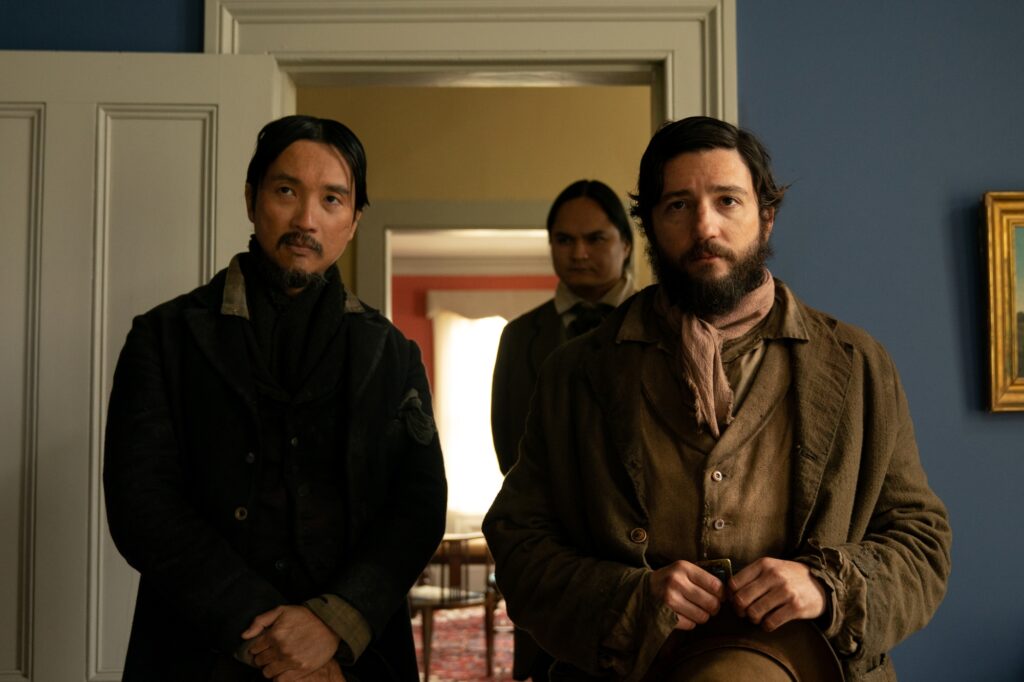
And the film itself isn’t very dialogue-rich, so a lot is communicated in the way the characters perform those everyday tasks and fall into each other’s rhythm of life. Did you do much research, particularly around recipes and cooking methods of that era?
John Magaro: Yeah, I did. Beforehand, Kelly sent me a few cookbooks that were from the Lewis and Clark expedition. That’s the genesis of the Oregon Trail – those are the first European, white people who venture into that territory. And they were learning skills from First Nation people. So, in their journals they had these recipes of things they’d made on the trail, and I found myself working through these cookbooks. It’s a very slow and patient way of cooking, and that helped me find the rhythm and quietness of Cookie.
Interesting too to see how people on the Frontier react to tasting the oily cakes… what would you call them, like beignets almost?
John Magaro: It’s just fried dough. I think every culture probably has a version of fried dough because it just tastes great. In this case it’s like a beignet, or you might call it a funnel cake.
Right, and it’s so compelling seeing how the other characters react to the taste. They’re so enamoured with the flavour of something they chose to leave behind.
John Magaro: It’s such an innocent treat. It brings back memories of childhood; it’s said perfectly by Toby Jones’ character, when he says it tastes like London. He’s clearly harkening back to his youth and his home, and the thing that he’s left behind. And I think that for Cookie to be the one who brings it into this world, such an innocent soul, is perfect.
And as we wrap up, what can we expect next from you both?
Orion Lee: I am going to be in an animation which comes out in 2022. That’s all I can say.
John Magaro: There’s a few things coming out this summer. I think there’s a film called Lansky [retitled as A Righteous Man] that comes out in June or July. And then the Sopranos prequel, The Many Saints of Newark, that comes out in September, I think.
Orion Lee: My wife is so excited to see that!
First Cow is released by MUBI in cinemas May 28th.
